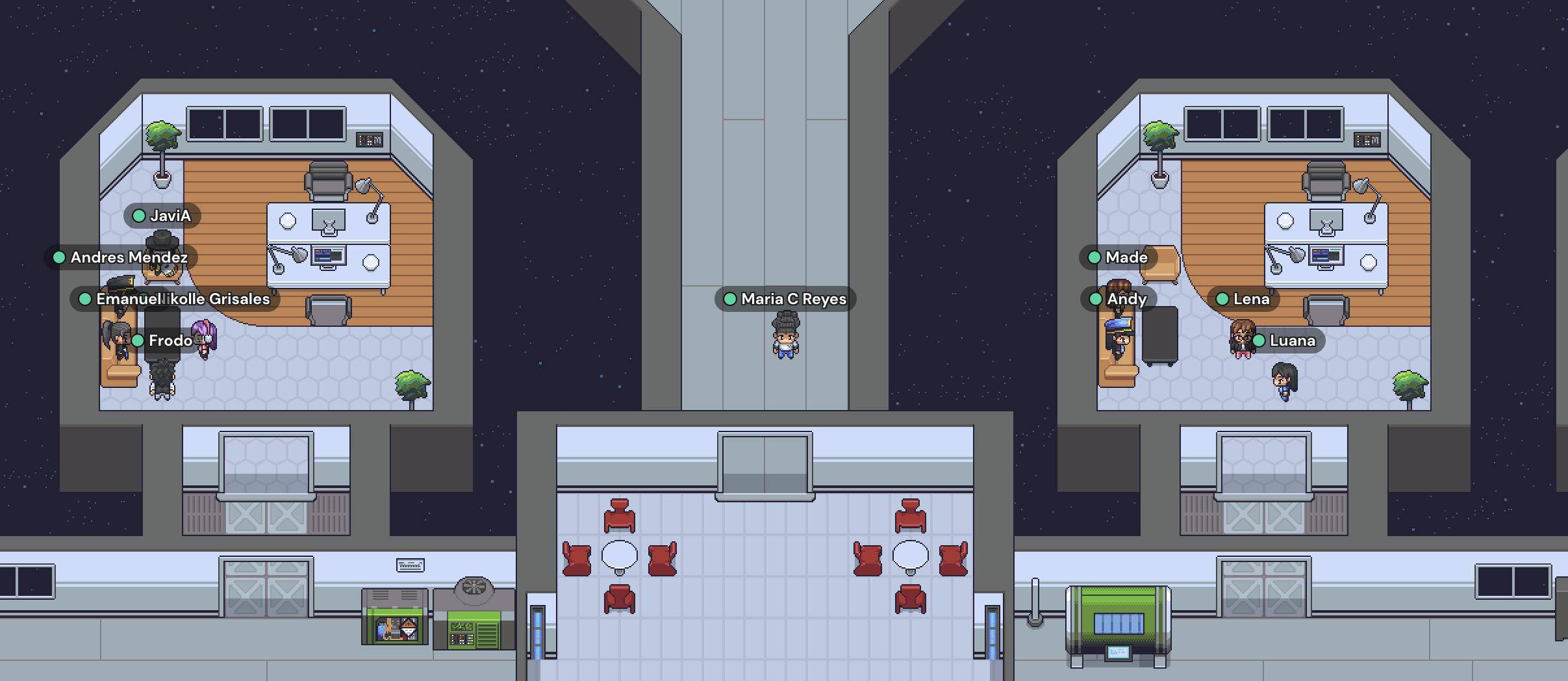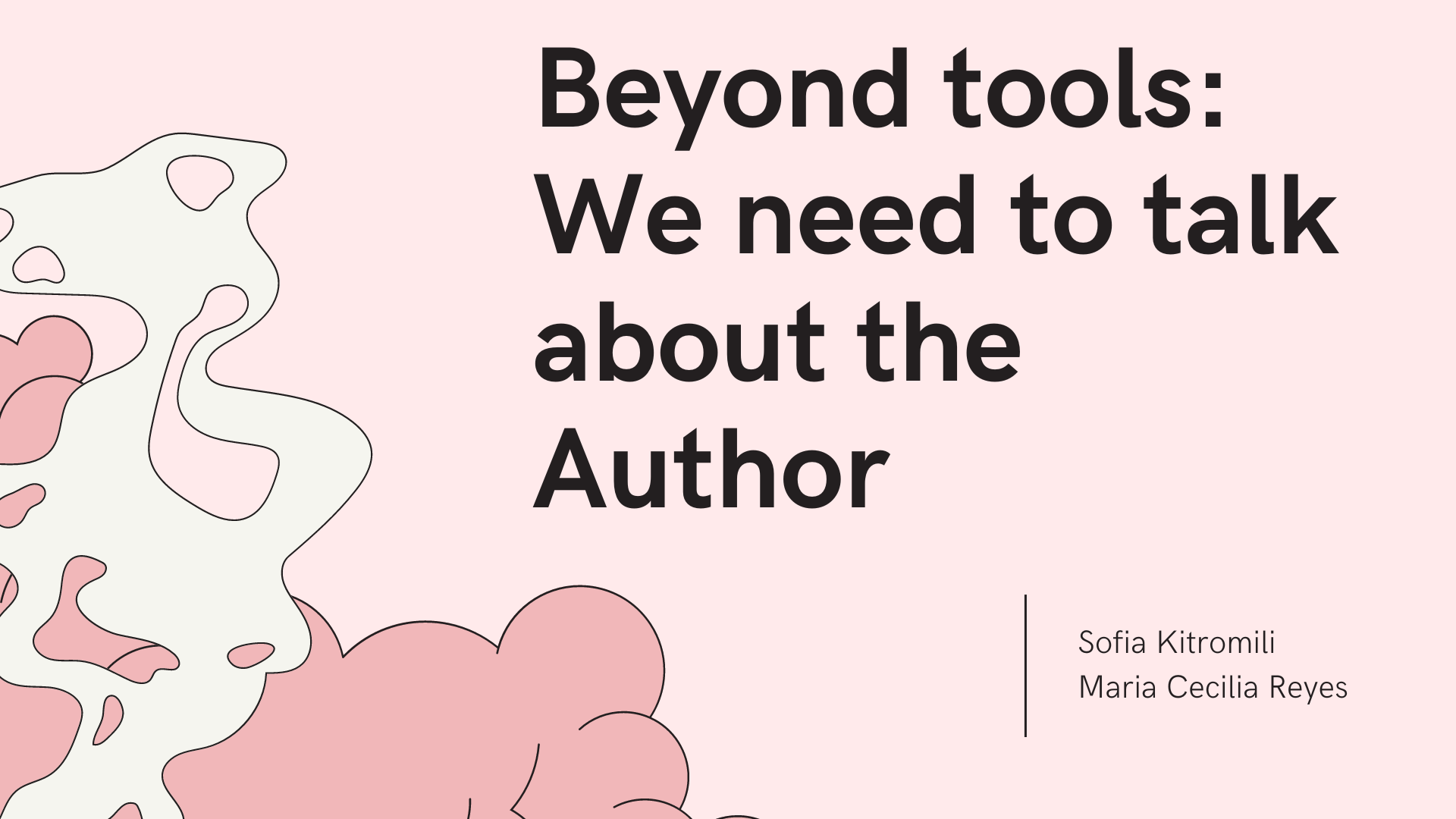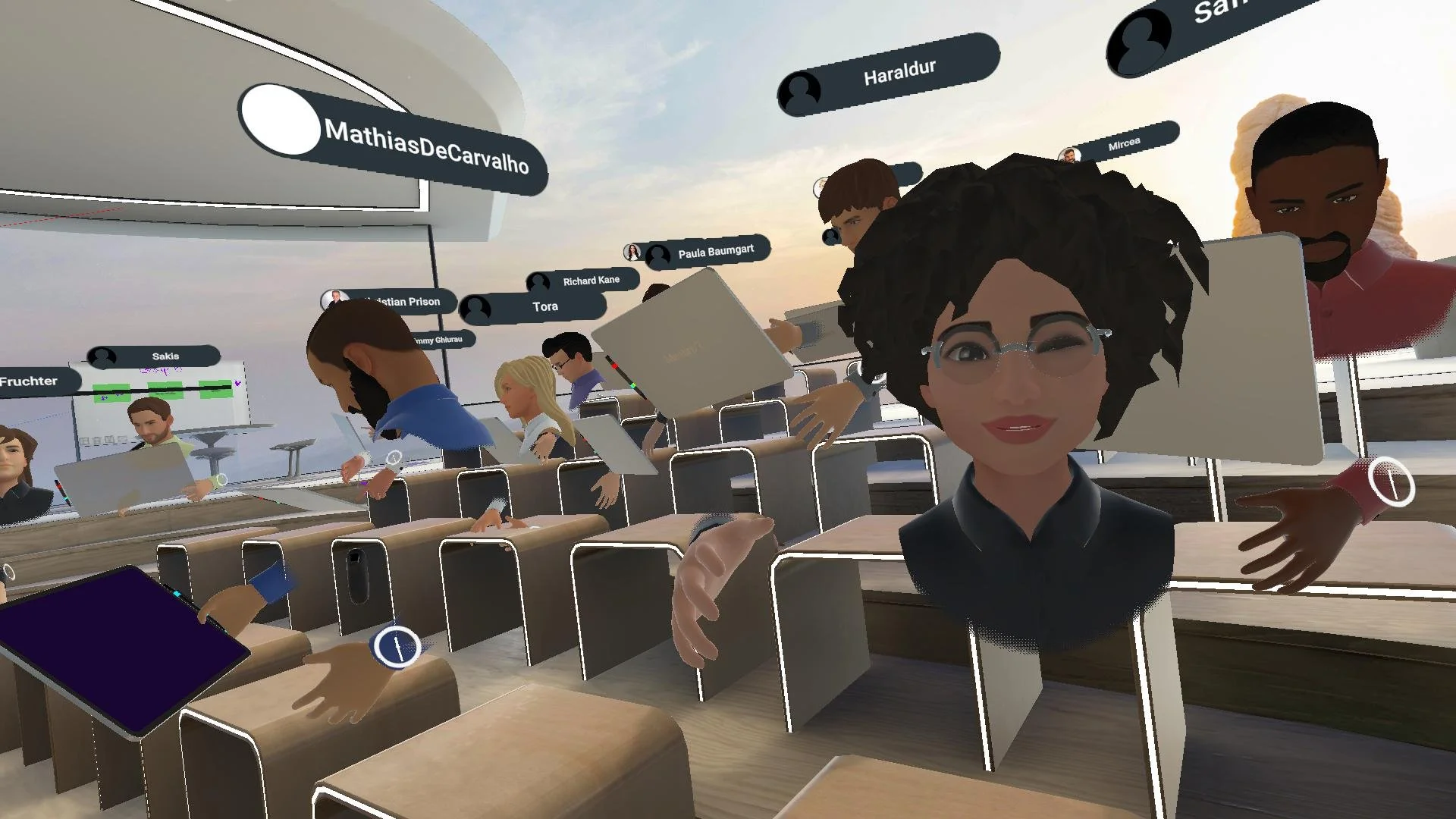Caja de Herramientas IA para Periodistas
Taller sobre herramientas de inteligencia artificial para periodistas, junto a Andrea Cancino, en el Summer Camp de la Casa Periodísitca El Punto en Uninorte.
Ricerca-creazione: Quando le forme creano valori
Sono stata invitata a partecipare della Giornata di Studi “Ricerca-creazione: quando le forme creano valori” il venerdì 20 e sabato 21 gennaio 2023 a Palazzo Ducale-Fondazione per la Cultura di Genova (Italia), dove presenterò la mia esperienza di ricerca-creazione nello sviluppo della mia tesi di dottorato “Interactive Fiction in Cinematic Virtual Reality: Epistemology, Creation and Evaluation”.
Sono stata invitata a partecipare della Giornata di Studi “Ricerca-creazione: quando le forme creano valori” il venerdì 20 e sabato 21 gennaio 2023 a Palazzo Ducale-Fondazione per la Cultura di Genova (Italia), dove presenterò la mia esperienza di ricerca-creazione nello sviluppo della mia tesi di dottorato “Interactive Fiction in Cinematic Virtual Reality: Epistemology, Creation and Evaluation”.
Da circa vent’anni, con il nome di “ricerca-creazione” è nato un movimento che si è diffuso in circuiti accademici in Canada, negli Stati Uniti e in Francia. Con questo termine si designano pratiche che mirano a decompartimentalizzare le arti e le scienze al fine di rinnovare le forme della conoscenza, di pensare in azione, di produrre nuove maniere di apprendere le realtà sociali, di rendere visibili i problemi pubblici e di costruire altre forme di vita. Queste pratiche privilegiano le attività di indagine, osservazione, ricerca basate su dispositivi artistici che spostano le prospettive e ci inducono a vedere diversamente ciò che a volte abbiamo davanti a noi senza accorgercene, o che ci permettono di sperimentare altri modi di fare e di vivere insieme. Le pratiche della ricerca-creazione si concretizzano sia in attività di ricerca nelle accademie artistiche, sia all’università o in residenze in spazi culturali. Possono essere attività individuali o di gruppo, più o meno radicate nelle istituzioni. Queste pratiche contribuiscono non solo all’osservazione e alla valutazione della realtà, ma anche alla creazione di valori.
La ricerca-creazione si basa sul principio che la ricerca può rinnovare i suoi metodi, gli strumenti e i concetti lavorando a stretto contatto con le pratiche artistiche. Un punto di partenza è l’idea che sono le forme a creare i valori, dato che i valori non possono essere decretati a priori. Le pratiche artistiche diventano così le alleate del ricercatore che, attraverso di esse, cerca di spostare, comprendere, modificare le strutture relazionali sottese alla costruzione dei valori su cui si basano i nostri modi di esistere.
La giornata di studio franco-italiana scommette che queste pratiche che si stanno diffondendo nel mondo e in Italia, generando saperi e forme di vita alternative, non rivendicando necessariamente il nome di ricerca-creazione, ma prendendone la forma.
Uninorte en Verano - Narraciones Inmersivas
Este verano estuve compartiendo con los futuros estudiantes de comunicación social y de filosofía, algunas nociones sobre los espacios inmersivos, la virtualidad, y la producción de cortometrajes en un entorno simulado.
En 3 días, los estudiantes produjeron 5 cortometrajes todos realizados en Mozilla Hubs.
Este verano estuve compartiendo con los futuros estudiantes de comunicación social y de filosofía, algunas nociones sobre los espacios inmersivos, la virtualidad, y la producción de cortometrajes en un entorno simulado.
Los objetivos del taller fueron:
Comprender el lenguaje audiovisual inmersivo
Reconocer los ambientes simulados y cómo movernse en ellos
Desarrollar un storyboard inmersivo
Producir un cortometraje en un ambiente inmersivo
““La inmersión genera sensaciones psicológicas que hacen dificil diferenciar la realidad física de la realidad mediada” ”
Beyond tools: We need to talk about the Author
Sofia Kitromili and I will be presenting our position paper “Beyond tools: We need to talk about the Author” at the Narrative and Hypertext Workshop during the conference HT ’22: 33rd ACM Conference on Hypertext and Social Media, held in Barcelona.
Some results of our activity.
Sofia Kitromili and I presented our position paper “Beyond tools: We need to talk about the Author” at the Narrative and Hypertext Workshop during the conference HT ’22: 33rd ACM Conference on Hypertext and Social Media, held in Barcelona.
Beyond Tools: We need to talk about the Author (Position Paper. PDF)
Sofia Kitromili (Bournemouth University, UK) and Maria Cecilia Reyes (Vilnius University, Lithuania)
Abstract: Ever since digital interactive authoring tools made creating IDNs (Interactive Digital Narratives) approachable to a wide audience of people beyond programmers and curious academics, we have not stopped talking about them. We have been inventing them, testing them, improving them, and re-inventing them tirelessly. As we should. However, if we take a step back and think about what we have really been talking about, whenever we meet to discuss interactive digital narratives, is tools, narrative forms, ‘the authoring problem’, and while all those are topics we should be discussing, and building knowledge on, we have forgotten to discuss about humans. Who are we building these tools for? Who is using them to make the stories? How are they using them? It is about time we take a break from talking about the myriads of our tools. In this article we are going to talk about the interactive author, or as we shall refer to them at the end of this article, the interactive creator.
Guest Lecturer @ Vilnius Tech
I was invited by Prof. Andrius Suminas to give a guest lecture at the Creative Communication program of Vilnius University, in the Media Theory course. I will be talking about immersive interactive narratives, media evolution landscape, immersion, narrative and interactivity.
I was invited by Prof. Andrius Suminas to give a guest lecture at the Creative Communication program of Vilnius University, in the Media Theory course. I will be talking about immersive interactive narratives, media evolution landscape, immersion, narrative and interactivity.
Hybrid ICIDS 2021
The 14th International Conference on Interactive Storytelling “Interconnectedness and Social Impact” ICIDS 2021 was a hybrid conference taking place at Tallinn University and online through Worksup.
The 14th International Conference on Interactive Storytelling “Interconnectedness and Social Impact” ICIDS 2021 was a hybrid conference taking place at Tallinn University and online through Worksup.
ICIDS is the premier conference for researchers and practitioners concerned with studying digital interactive forms of narrative from a variety of perspectives, including theoretical, technological, and applied design lenses. The annual conference is an interdisciplinary gathering that combines technology-focused approaches with humanities-inspired theoretical inquiry, empirical research and artistic expression. This year is the 14th edition of the conference. ICIDS is the main academic conference of the Association for Research in Digital Interactive Narratives (ARDIN).
I had the honor to serve as Co-Virtual Chair, together with Josh Fisher, taking care of the website and spatial venues for Demos, Posters and Coffee Breaks on Mozilla Hubs.
INDCOR Interview: “My career has always been a negotiation between the artistic path and academia”
She is filmmaker, storyteller, screenwriter and also, the INDCOR Social Chair and the Virtual Networking Manager. From Barranquilla (Colombia), with a double PhD from the University of Genoa (Italy) and Universidad del Norte (Colombia), she moved to Germany to be Artist-in-Residence at Schloss Solitude Akademie. Together with six Virtual Mobility grantees, she will be working on a virtual strategy to improve the networking of the INDCOR members.
INDCOR Communications Chair interviewed me for the blog of our COST Action CA18230 - Interactive Narratives Design for Complexity Representations, during our fall meeting in Budapest.
Here is the full post.
She is filmmaker, storyteller, screenwriter and also, the INDCOR Social Chair and the Virtual Networking Manager. From Barranquilla (Colombia), with a double PhD from the University of Genoa (Italy) and Universidad del Norte (Colombia), she moved to Germany to be Artist-in-Residence at Schloss Solitude Akademie. Together with six Virtual Mobility grantees, she will be working on a virtual strategy to improve the networking of the INDCOR members.
How did you know about INDCOR?
I joined the Interactive Digital Storytelling community through our conference ICIDS of 2015 in Copenhagen. At the time, I was in the first year of my PhD in Digital Humanities at the University of Genoa (Italy), and as a filmmaker and storyteller, I was interested in interactive ways to tell stories. The academic conference and the art exhibition of that year literally opened a new world for me. A great number of colleagues from this community are now working on a new frontier of the field of interactive digital narratives, that is the representation of complexity, INDCOR. When I heard about using IDNs to analyze complexity, at the first edition of the ZIP-SCENE conference in Budapest, my mind was overwhelmed about all the possibilities that IDNs offer us to understand our world.
What does it mean to be the Social Chair?
This position came up with the pandemic situation, and the need to gather the members of our action to meet each other and discuss relevant topics for our work. Collaborations, papers, projects, new ideas often are generated in relaxed environments, the breaks in the conference, a networking dinner, a walk, so the social chair position was intended to generate these spaces online. We started to use gather.town to make the meetings, and probably some of you can remember the first INDCOR social when we were banned by Facebook for promoting our keynote speakers on conspiracy theories narratives. With this position that now has become Virtual Networking Support Manager, my main goal is to facilitate the networking between the members of the action, for the production of knowledge, but also to create new unexpected synapses in our network.
How is your research related to Interactive Digital Narratives?
I come from a communication sciences background, I have worked in radio for many years, and simultaneously I have worked as a documentary filmmaker. My career has always been a negotiation between the artistic path and academia. In my city, Barranquilla in Colombia, I started teaching the first course on audiovisual narratives and new media, back in 2013. This is how I started doing research but also producing interactive video stories, some with my students, and some on my own. In 2014, with the hype of 360º video, and interactive 360º video, I started to get close to virtual reality research. And my PhD thesis is precisely about “Interactive Fiction in Cinematic Virtual Reality“, I would say in the heart of IDNs.
As an artist, where can we see you work?
Some of my artistic work can be found on my online portfolio Xeh Reyes. However, recently with my VR projects I’ve been facing an issue very well-known for new media artists, and that is the obsolescence of the platforms, hardware and software that we used to create our work. I’m working together with the team of the authoring software that I used to create my projects to find a way to reproduce my work on newer VR headsets.
You are involved in the Virtual Networking Support Team for INDCOR. What is the main goal of this group?
This opportunity was born thanks to the Virtual Networking Tools that COST habilitated last year due to the pandemic. Together with the Virtual Networking manager and six Virtual Mobility grantees, we are about to implement a very complete strategy to improve the networking between the action members. The strategy includes the organization of our asynchronous and synchronous networking tools as Google Drive and Discord, but also new online activities as workshops and training sessions with external stakeholders, and in general improved procedures to work on our field and publish our results. This is a dream team formed by early-career researchers with great ideas and energy to boost the action.
Online and Inspiring ICIDS 2020
An overview of ICIDS 2020, a 100% online conference. Here’s a recap of all the strategies to make this year’s conference a huge success, mixing digital platforms and using creativity to generate an inspiring space of research and collaborative work for the Interactive Digital Narratives community.
The 13th edition of the International Conference on Interactive Digital Narratives - ICIDS 2020 just ended. After months deliberating if having a mixed conference or a totally online conference, we finally agreed that the best solution was to have an virtual conference.
The virtual Live/synchronous conference was articulated through different platforms: a single room on ZOOM for all the academic events (papers, keynotes and debates) which gave us the feel of continuity, that feeling of being in a conference leaving the jacket on the auditorium to come back after the breaks; a Discord Server with multiple dedicated channels for discussion, questions, announcements, and videoconference tables to “meet the artists” or meeting the presenters of posters and demos; and finally a Gather Town space to socialize after the academic talks.
We also had 3 live artistic performances: An interactive theater piece The Evidence Chamber (twice) and the netprov Fantasy Spoils: After the Quest, and an one-hour radio show: ARDIN Radio, everynight with a recap of the conference day.
The asynchronous conference had space through 3 different websites:
The main website of the conference with the schedule and general info.
The website of the Art Exhibition “Texts of Discomfort”_ with 18 selected pieces. Each piece contained a link to download the artwork or a link to web-based artworks, and a video in which each artist presents their work. In this way interactors were able to enjoy the pieces in their own time and space, protecting that intimacy between the digital art piece and the visitors.
The website of ARDIN - Association of Research in Digital Interactive Narratives_ This website contains all the academic presentations with 20’ videos, and the recordings of all the live ZOOM sessions of the conference.
A very dynamic conference with several pros regarding the physical conference, and not a lot of cons, as we might have thought at the beginning. For sure, nothing replace the physical contact with researchers and artists, however now we can’t go back from this virtual experience, and everything indicates that the future is hybrid.
Invited Speaker - Monthly ARDIN Online Social
I have the honor to be an invited speaker together with Josh Fisher on the first ARDIN online social, next 30th of September on gather.town.
On September 30th we will be hosting our first ever ARDIN social and grad student meet-up!
Time: 1 pm to 3 pm EST | 7 pm to 9 pm CET
Agenda:
ARDIN Social: Discussion of news relevant to the community, 1 invited speaker (Josh Fisher), member's announcements, academic speed-dating session.
Grad Student Meet-Up: A roundtable discussion of what our community's graduate students are working on, 1 invited speaker (Maria Reyes). Graduate students, come ready to briefly pitch the projects you're working on!
About the Speakers:
Josh Fisher: I work with emerging media forms to facilitate social change. My specific focus is on community storytelling and I collaborate with community leaders, artists, educators, writers, and students on stories of communal significance. For example, I developed an augmented reality storytelling platform for Georgia Tech. Then, as part of my research, assessed the impact of the platform through both qualitative and quantitative methods. Over the years, I have become an established public speaker and storyteller with performances, lectures, and talks on digital publishing, interactive narratives, and augmented reality design. I have had the pleasure of teaching courses on visual design, interactive storytelling, communication and culture, mobile and web design.
Maria Reyes is a Colombian researcher and screenwriter based in Italy and working as a researcher at the Institute of Educational Technologies at the National Research Council of Italy (CNR-ITD). She holds a double PhD degree in Digital Humanities from the University of Genoa (Italy) and in Communication Sciences from Universidad del Norte (Colombia). Her research focuses on interactive digital narratives, immersive technologies and distance learning processes.
During her career, Dr. Reyes - known to her friends as Xeh - has worked as lecturer in digital storytelling and cinema; as a screenwriter and editor for cinema; as a creator of interactive VR projects; and as a radio producer at the Latin American Association of Educational Radio (ALER). She is researcher-in-residence 2020-2021 at Schloss Solitude Akademie. Co-curator of ICIDS 2020 Art Exhibition.
















